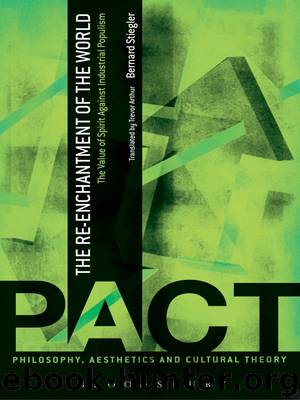The Re-Enchantment of the World by Bernard Stiegler

Author:Bernard Stiegler
Language: eng
Format: epub
ISBN: 9781441150561
Publisher: Bloomsbury Academic
Published: 2014-12-15T16:00:00+00:00
The plane that enchants me
Capitalism necessitates motivation, which is always a kind of enchantment: it cannot rest upon a drive that, if nothing changes, will destroy it, and us along with it. Motivation itself, of whichever sort it may be—capitalist, judeo-christian, tragic-greek, or pre-political, which is to say, magical, shamanic, basilic, or dynastic—thrives upon singularity. Singularity alone can be the object of libido that constitutes the human as desire, that is, as not being inhuman.
Singularity is of course nothing but fantasy. Since Newton, we can say that everything is calculable: if nature is written in mathematical language, physics is a mathematical physics, that is insofar as all phenomena can be described by an equation, itself capable of being transformed into an algorithm, and thus, beginning with the industrial revolution, into computational technology.
However, what makes the object of desire is incalculable. With regard to desire, there is nothing but the incalculable, and this means that for desire, there is a plane other than that of the calculable—by relation to which alone is the calculable worth anything. This other plane is also what forms the motifs of the mathematician and the physicist: what is of interest, for them also, are the incalculable—the idealities, the axioms, the indemonstrables.
The question and the object of desire are thus singularity considered as what appears incalculable, that is, incomparable and so in-finite (everything that is calculable is finite, and vice versa). That is why art, more than any other object, is the very example of the object of desire qua sublimation—at least since the death of God: as long as He was there, a work of art made one see a light which was that of His revelation. Today, our experience of singularity par excellence is that of the work of art about which Kant said that its qualification by aesthetic judgment—namely in the epoch of Kant, as “beautiful”—is the fruit of a reflective judgment, which is to say, such that I will never be able to prove it: I will never be able to prove that the object of my judgment (“this object is beautiful”) is in fact an object such that I can judge it, namely that it is beautiful. Such a judgment is literally improbable, which means here that it cannot be proved (prouvé)—but that it can only be experienced (éprouvé).
Now, this is the case because the work is singular, that is, incalculable: the work is the object of a reflective judgment to the exact extent that (through what presented itself to Kant as “the beautiful”) it reflects and intensifies the singularity of he who judges, and allows him to be projected as his motif itself, that is, as the object of his desire: as the desirable object par excellence, and desirable for everyone, which is the reason why Kant posits that reflective judgment tends irreducibly to universalize itself, presenting itself as a universal judgment; but it is a universal by default: its universality cannot be proven. It is a reflective judgment in the
Download
This site does not store any files on its server. We only index and link to content provided by other sites. Please contact the content providers to delete copyright contents if any and email us, we'll remove relevant links or contents immediately.
The Leavers by Lisa Ko(6459)
Born to Run: by Christopher McDougall(6248)
iGen by Jean M. Twenge(4692)
Sapiens by Yuval Noah Harari(4528)
The Kite Runner by Khaled Hosseini(4407)
Spare by Prince Harry The Duke of Sussex(4188)
Bullshit Jobs by David Graeber(3171)
Livewired by David Eagleman(3113)
Goodbye Paradise(2948)
Never by Ken Follett(2867)
A Dictionary of Sociology by Unknown(2516)
Harry Potter 4 - Harry Potter and The Goblet of Fire by J.K.Rowling(2412)
The Club by A.L. Brooks(2348)
People of the Earth: An Introduction to World Prehistory by Dr. Brian Fagan & Nadia Durrani(2343)
The Social Psychology of Inequality by Unknown(2303)
Machine Learning at Scale with H2O by Gregory Keys | David Whiting(2261)
Harry Potter and the Order of the Phoenix (5) by J.K. Rowling(2224)
0041152001443424520 .pdf by Unknown(2212)
Don't Sleep, There Are Snakes by Daniel L. Everett(2212)
